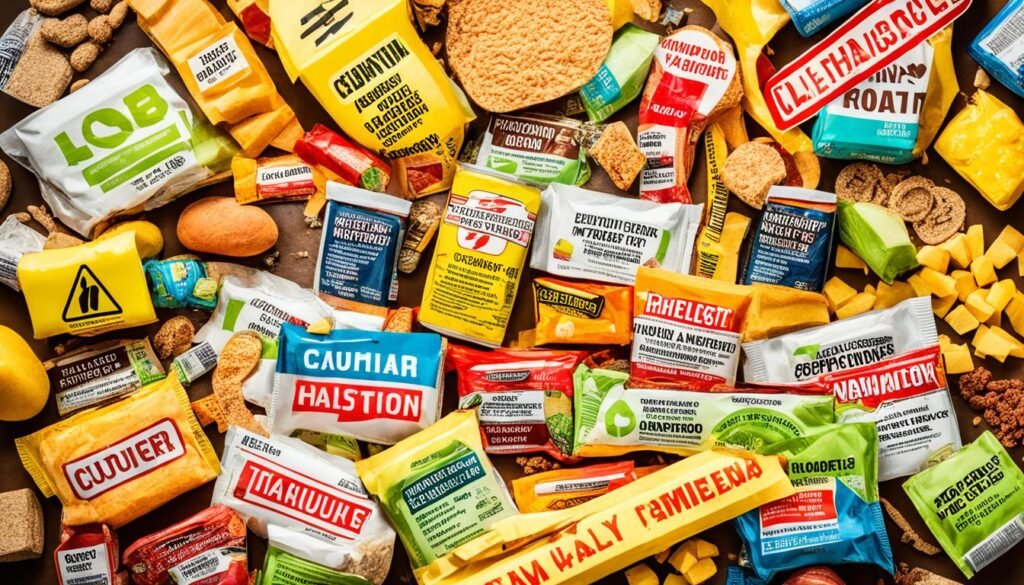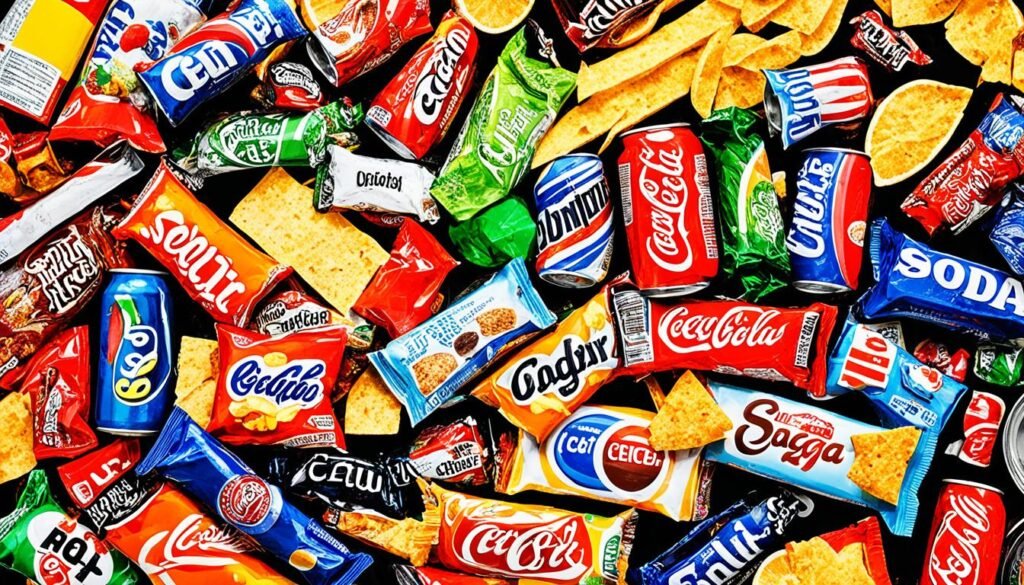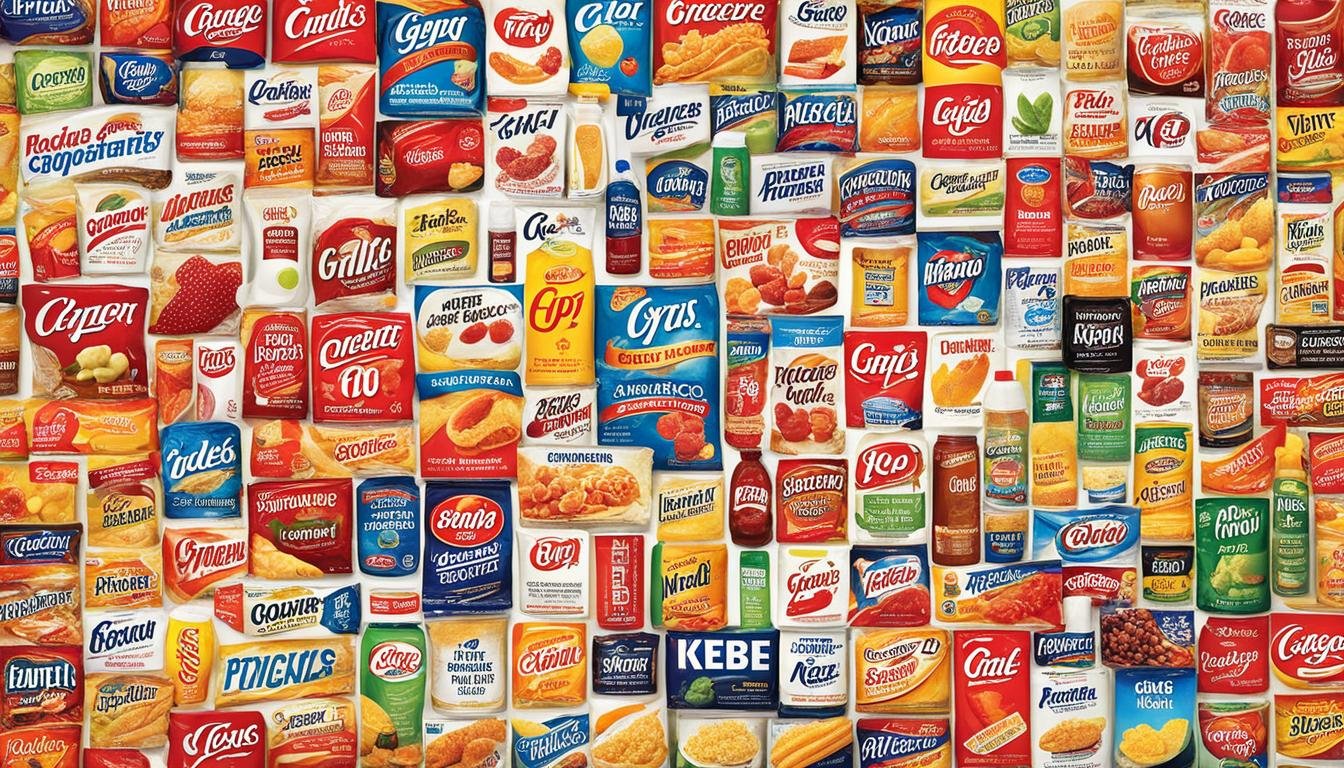Many people worldwide are eating more processed foods like ready meals and baked goods. But, this trend has led to health problems. People are gaining weight and getting sick with diseases like type 2 diabetes.
These foods are full of sugar, artificial stuff, and trans fats. They are becoming a big part of what we eat every day. Studies now show they increase the risk of heart problems and dying early.
But, not all processed foods are bad for you. Food that’s been changed using machines, without adding bad chemicals, can still be good for you. Yet, foods made with chemicals, called “cosmetic,” are not so healthy. They can make you obese and sick.
When you know the dangers of processed foods, you can choose better for your health.
Key Takeaways
- Processed foods are linked to weight gain and type 2 diabetes.
- High sugar, artificial ingredients, and trans fats contribute to the harmful effects of processed foods.
- Ultra-processed foods increase the risk of cardiovascular disease and coronary heart disease.
- Not all processed foods are unhealthy; mechanical processing typically retains nutritional value.
- Chemical processing and cosmetic foods often lack nutritional value and contribute to obesity.
Introduction to Processed Foods
Processed foods come in many types, causing confusion about their health effects. Some are not bad for you, like those that keep their nutrients after light processing. Yet, it’s key to know why processed foods are bad for you to pick what’s best.
“Ultra-processed foods, typically containing little to no whole ingredients, are packed with added sugars, fats, and artificial substances,” – Harvard School of Public Health
Ultra-processed foods bring the most processed food dangers. They’re easy to get, cheap, and tasty, but they may harm your health. These foods often look good and last a long time, hiding their low nutrition.
| Minimally Processed Foods | Ultra-Processed Foods |
|---|---|
| Retain most natural nutrients | Lack essential nutrients |
| Fresh or lightly preserved | Contain added sugars, fats, and artificial substances |
| Simple packaging | Highly attractive packaging |
| Shorter shelf life | Extended shelf life |
Understanding processed food dangers is vital in making good dietary choices. By knowing the problem with ultra-processed foods, you can choose what’s best for your health.
How Processed Foods Contribute to Weight Gain
More and more people are worried about eating processed foods because of how they lead to gaining weight. People love them for their quick and easy meals, but they’re not good for us. These foods have a lot of calories but not many useful nutrients. This means they’re very likely to make us put on extra weight.
High in Calories and Low in Nutrients
Processed foods have lots of calories but hardly any good nutrients. Eating them can make you not feel full, so you keep eating more. Missing out on dietary fiber in these foods is a big reason why. When you eat more than you need, it can pile on the pounds fast.
The Role of Added Sugars and Fats
These foods also have too much sugar and fat in them. Things like high fructose corn syrup make them taste good but are bad for you. The problem is, these ingredients make your body want to eat even more. Overdoing it with sugars and fats can lead straight to obesity. It can also bring on diseases such as diabetes and other health concerns.
Processed Foods and Increased Risk of Type 2 Diabetes
Processed foods can be dangerous for your health, and a major risk is the chance of getting type 2 diabetes. They contain lots of refined carbs and sugars. These can mess up how your body deals with blood sugar, causing insulin resistance and other problems.
Impact of Refined Carbohydrates
Refined carbs in processed foods digest fast. They make your blood sugar and insulin levels jump quickly. This can lead to sudden drops in energy. It can also make you want to eat more, causing you to gain weight. These swings throw off your body’s balance and up the chance of getting type 2 diabetes.
Link Between High Fructose Corn Syrup and Diabetes
High fructose corn syrup (HFCS) is a common sweetener in processed foods. It’s bad for your health, especially for your metabolism. HFCS messes with how your insulin works and can cause insulin resistance. This change in your body functions is making type 2 diabetes more common around the world. It shows the dangers of eating processed foods with HFCS.
Heart Health Risks Associated with Processed Foods
Ultra-processed foods are linked to a higher chance of heart disease. They often contain lots of bad fats, sugar, and salt. These increase the risks of cardiovascular disease, heart issues, and strokes. Trans fats from processing oils also cause inflammation, bad for our hearts and risk of stroke.
Saturated fats and sugars in processed foods raise our heart risk a lot. The artificial trans fats make things worse by causing inflammation.
- High levels of sodium can lead to hypertension, an important risk factor for heart disease.
- Increased sugar intake is associated with higher triglyceride levels, another cardiovascular risk factor.
- Artificial trans fats, found in many processed foods, disrupt lipoprotein balance, leading to higher LDL (bad) cholesterol and lower HDL (good) cholesterol.
- Cardiovascular Disease
- Coronary Heart Disease
- Stroke
| Processed Food Ingredient | Health Impact |
|---|---|
| Saturated Fats | Increases LDL cholesterol, leading to cardiovascular disease |
| Added Sugars | Raises triglyceride levels, contributing to heart disease |
| Sodium | Causes hypertension, a major heart disease risk factor |
It’s important to know the dangers of processed foods. By eating less of these, we can reduce the risks and be kinder to our hearts.
Artificial Ingredients and Their Harmful Effects
Processed foods are full of artificial additives, making them risky for your health. These additives can harm you in many ways. This is a big reason why processed foods aren’t good for you.
Common Artificial Additives
Processed foods often include a mix of artificial additives, like:
- Preservatives
- Artificial colorings
- Flavorings
- Texturizing agents
These additives are there to keep the food looking good and lasting longer. But, they can also make the food unhealthy.
Impact on Health and Well-being
Many people are debating whether artificial ingredients in food are safe. Often, these additives are labeled as “artificial flavor,” which can make them hard to avoid. Eating them regularly can cause health problems like allergies and stomach pains. These issues highlight the need to be careful about what we eat.
The Fiber Deficiency in Processed Foods
Eating less fiber, especially from processed foods, harms our health. Fiber is key for a good digestion, keeps blood sugar even, and makes us feel full. But, many ultra-processed foods have little or no fiber left. This leads to many bad health issues.

Importance of Dietary Fiber
Fiber is crucial in our meals. It keeps our bowels healthy, lowers bad cholesterol, and stabilizes blood sugar. But, processed foods often lack fiber. This makes the risks from eating them even worse.
Consequences of Low Fiber Intake
Not getting enough fiber can cause a lot of problems. Things like constipation and hemorrhoids are more likely. Also, it can raise blood sugar, which might lead to type 2 diabetes and heart problems. Knowing about the dangers of processed foods helps us pick better foods.
The Role of Preservatives in Processed Foods
Preservatives are key in keeping processed foods fresh for longer. This makes meals convenient for your schedule. Yet, it’s crucial to be aware of the risks preservatives in processed foods might bring.
Many processed foods use chemicals like sodium benzoate and potassium benzoate. These can be risky, especially if mixed with vitamin C or heated. They might create benzene, a harmful chemical linked to cancer.
Eating foods with these preservatives could up your risks for thyroid problems and some cancers.
- Sodium Benzoate: Found in acidic foods, soft drinks, and juices to stop them from going bad.
- Potassium Benzoate: Used much like sodium benzoate, especially in foods and drinks. They help prevent spoilage, especially in high-vitamin C products.
While preservatives do help keep food safe longer, they also hide dangers. This shows why we must choose our foods wisely.
Understanding Why Processed Foods Are Bad for You
To see why processed foods are bad, it’s key to know how they’re made. There’s mechanical and chemical processing. The types of changes they make to food affect your health differently.
Difference Between Mechanical and Chemical Processing
Mechanical processing includes things like grinding and chopping. These changes don’t remove many nutrients. They help keep food fresh and easy to use.
Chemical processing, on the other hand, changes the food’s makeup a lot. It often takes away good nutrients and adds fake ones. Foods changed this way can bring big health risks.
Hidden Chemicals in Processed Foods
One big issue with processed foods is the secret chemicals they hide. Things like artificial flavors and colors are often not clearly mentioned. They might just be called “natural flavor.”
These hidden chemicals can cause many health problems. It’s important to pay attention to them. Knowing about these risks helps you choose what you eat wisely.
Processed Foods: A Gateway to Obesity
Processed foods are key in making many people overweight. They’re full of calories but lack good nutrients. This makes it easy to eat too much. When this is joined with a lifestyle lacking exercise, obesity often follows. This can lead to serious health issues like heart disease, diabetes, and high blood pressure.

The big issue with processed foods is how they’re made. They’re packed with calories and flavors but do little to help your health. Things like snacks, sodas, and meals ready in a flash are full of sugars and fats. These are made to taste so good you can’t stop eating or drinking them.
| Processed Food Item | Caloric Density | Nutritional Value |
|---|---|---|
| Snack Chips | High | Low |
| Soda | High | Minimal |
| Ready Meals | Moderate to High | Low |
Choosing processed foods is often linked to our busy lives. Fast food and quick meals do save time. But the costs to your health over time matter a lot. They add to problems like obesity and the risks that come with it.
6 Dangers of Processed Foods and Their Ingredients
Processed foods are common in homes for their ease and low cost. But, knowing their health risks is vital. Let’s see six main dangers of eating them:
- Obesity: Processed foods are high in calories but low in nutrients. They often lead to eating more than needed.
- Metabolic Syndrome: Eating these foods a lot can cause metabolic syndrome. This raises risks of heart disease, stroke, and diabetes.
- Type 2 Diabetes: Their refined sugars and carbs quickly raise blood sugar levels. This can lead to insulin resistance and diabetes.
- Heart Disease: Processed foods with lots of fats, sugars, and salts can harm your heart. They increase the risk of diseases like coronary artery disease and high blood pressure.
- Nutritional Deficiencies: These foods often miss important nutrients, fiber, and vitamins. This can lead to health and well-being problems.
- Exposure to Harmful Chemicals: Additives in processed foods, like preservatives and artificial colors, can be risky. They might even cause cancer and other health issues.
Knowing the dangers helps you choose your foods better. It’s important to understand and avoid these dangers to live a healthier life.
Cutting Down on Processed Foods for Better Health
Eating less processed food improves your health. When you eat less processed food, you reduce health risks. This helps you feel better all around.
Alternatives to Processed Foods
Choosing whole, natural foods is a great start. Here are some alternatives to processed foods to consider:
- Replace refined grains with whole grains such as quinoa, brown rice, and whole wheat.
- Choose lean meats like chicken or fish instead of processed meats like sausages and deli meats.
- Incorporate fresh fruits and vegetables into your diet to boost fiber intake.
Practical Tips for a Healthier Diet
Looking for tips to eat less processed food? Here are some ideas for a healthier diet:
- Plan your meals ahead of time to avoid the temptation of grabbing processed snacks.
- Read labels carefully to identify hidden sugars and artificial additives.
- Cook at home more often, using fresh ingredients to control the level of processing in your food.
- Stay hydrated by drinking water instead of sugary drinks and sodas.
- Snack on nuts, seeds, and fresh fruit instead of packaged snacks like chips or cookies.
By taking these steps, you can lower the risks of eating too many processed foods. This leads to a healthier life.
Conclusion
Learning about processed foods is key to living healthier. When you know about bad ingredients and their health effects, you choose better foods. It greatly helps your health. Problems from processed foods can lead to obesity and serious illnesses.
Eating less processed food and more natural ones is a great start. Include fresh fruits, veggies, whole grains, and lean meat in your meals. These foods have lots of good nutrients and no bad stuff. Always check food labels for hidden chemicals and sugars.
Choosing wisely can lessen the risks from processed foods. Even small changes can greatly improve your health. Starting to eat better is a journey. It’s about learning and making good choices daily. Being informed and careful is key to staying healthy and avoiding processed food risks.
